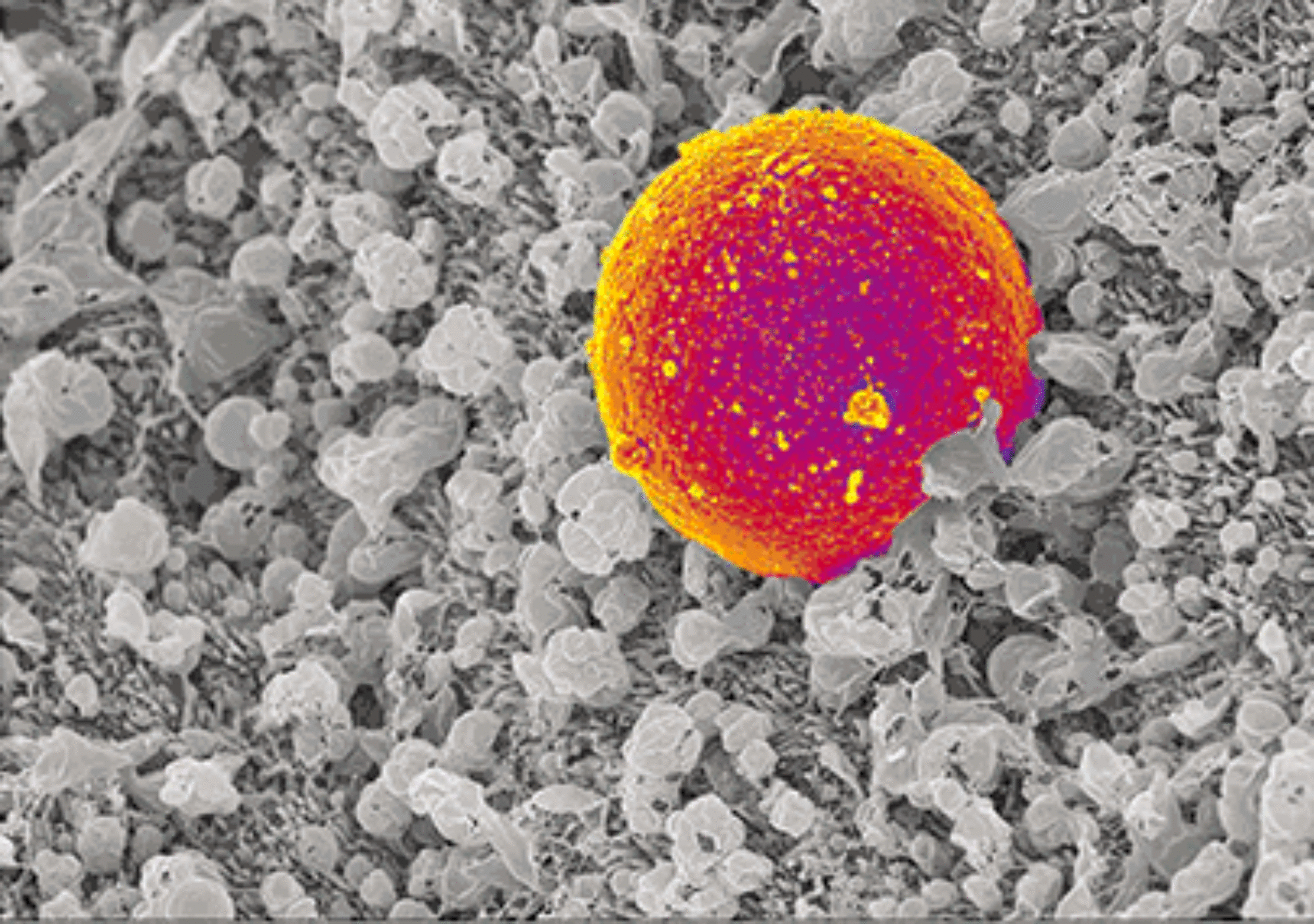
Kathleen M. Caron, Ph.D. is a Professor and Chair in the Department of Cell Biology & Physiology in the School of Medicine at the University of North Carolina at Chapel Hill—one of the nation’s largest, interdisciplinary physiology departments, consistently ranked in the Top 10 in NIH funding. Prior to her role as Department Chair, Dr. Caron served as Assistant Dean for Research in the School of Medicine. Dr. Caron graduated from Emory University with a BS in Biology and a BA in Philosophy. For her graduate work, she trained with Dr. Keith L. Parker in the Department of Cell Biology at Duke University where she elucidated the role of steroidogenesis in regulating sexual determination and adrenal and gonadal development using genetic mouse models. To gain more experience in gene targeting approaches, Dr. Caron pursued her postdoctoral training in the laboratory of Nobel Laureate Dr. Oliver Smithies at UNC-CH, where she was the first to discover the essential role of adrenomedullin peptide for embryonic survival. Her laboratory currently uses sophisticated gene targeting approaches to model human disease in mice. With a special emphasis on vascular biology, the Caron laboratory has gained valuable insights into the genetic basis and pathophysiology of lymphatic vascular disease, preeclampsia and sex-dependent cardiovascular disease. Dr. Caron has received numerous awards including a Burroughs Wellcome Fund Career Award in the Biomedical Sciences, an Established Investigator Award and an Innovator Award from the American Heart Association, a Jefferson Pilot Award in Biomedical Sciences and a UNC-CH Mentoring Award. . She currently serves as Associate Editor for ACS-Pharmacology and Translational Science and holds multiple scientific advisory roles in academia, industry and the National Institutes of Health. Dr. Caron is an accomplished teacher and mentor, having served as an advisor to over 50 graduate, post-graduate and clinical trainees. She is highly regarded for her impassioned drive for excellence and approach to individualized mentoring and career advising, as recognized by her participation in numerous symposia and articles related to professional development. Dr. Caron is married to Michael Datto, MD/PhD, Director of Clinical Laboratories for Duke Health Care System. They enjoy spending quality family time with their two children, Nicholas and Sophia. Publications
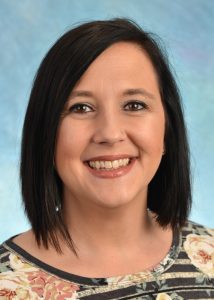
Liz Douglas earned her Bachelor of Science in Biology at Salem College in Winston-Salem, NC. She spent nine years at Wake Forest University School of Medicine as a laboratory technician in various labs, with the majority being in Timothy Peters, MD lab in Pediatrics Infectious Disease. During this time she focused on studying the movement of the Influenza virus and other respiratory pathogens within the population. Her expertise while at Wake included cell culture techniques and nucleic acid extraction, purification, and analysis. She joined Dr. Caron’s lab as laboratory manager in August 2015. She continues to hone her skills in molecular biology and learning new in vivo techniques. While not in the lab, she enjoys time with her husband, Donte, two children, Dorian and Kayla, and quilting. Publications

Bryan Kistner graduated from The University of North Carolina at Chapel Hill with a B.S. in Chemistry in 2022. During his undergraduate years, Bryan’s research focused on understanding cell-cycle mechanisms in endothelial cells to better understand the quiescent nature of vasculature. Bryan joined the lab in the summer of 2022 where he is interested in applying various research techniques to an eventual career in medicine. When not in lab, Bryan enjoys staying active, exploring the outdoors through hiking, and yoga.
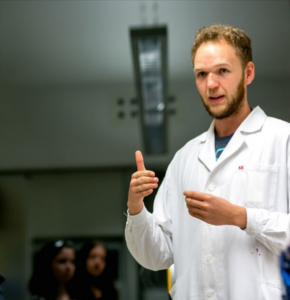
László Bálint received his PhD from Semmelweis University, Budapest, Hungary under the supervision of Zoltán Jakus. His focus was on characterizing the mechanisms that regulate the developmental program of the meningeal lymphatic vessels. He joined the Caron lab in the summer of 2021 and is interested in exploring the structural and functional heterogeneity of the lymphatic system and broadening our understanding of the regulatory mechanisms determining organ-specific lymphatic function. When he is not in the lab, he enjoys discovering nature while cycling and hiking. Publications
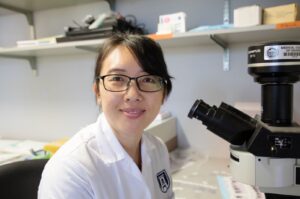
Yanna Tian received her Ph.D. in Physiology at Augusta University under the supervision of Dr. Zsolt Bagi. Her research focused on elucidating novel mechanisms of impaired wall shear stress-induced vasodilation of small resistant arteries in aging. Before her Ph.D. training, she received master’s degree in Preventative Veterinary Medicine at Yangzhou University, China. She is a certificated Doctor of Veterinary Medicine in China. Then she worked as a research assistant in the Center for Biotechnology & Genomic Medicine, Augusta University. She joined the Caron lab in the summer of 2022. She is interested in studying the mechanisms of G protein-coupled receptors (GPCRs) in the lymphatic vascular system and the role of lymphatic vessel in different organs under disease conditions. While not in the lab, she enjoys spending time with her family and friends, she also enjoys running and hiking. Publications
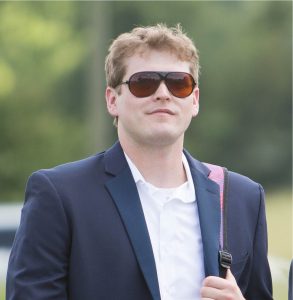
Stephen Serafin graduated from Wake Forest University with a B.S. in biology in 2010. He then completed a Master’s in Molecular Diagnostic Sciences (MMDS) at the University of North Carolina at Chapel Hill (UNC-CH) in 2011, where he studied as a clinical lab scientist to both utilize and develop molecular diagnostic tools to aid in patient care. Following his Master’s education, Stephen became a Research Technician/ Laboratory Manager at the Thurston Arthritis Research Center (TARC) at UNC-CH. While at TARC, he investigated the regulation of various G protein coupled receptors (GPCRs) implicated in rheumatoid arthritis pathogenesis. Stephen started graduate school in 2017 at UNC-CH and joined the Caron lab in 2019, where his work focuses on identifying GPCR and their associated ‘receptor activity modifying protein’ (RAMP) pairings in healthy and cancer-specific contexts. Publications

Nathan Nelson-Maney grew up in Shrewsbury, Massachusetts and graduated from the University of Massachusetts Amherst with a bachelor’s degree in biology. His undergraduate research focused on the evolution of complex traits within freshwater sunfish and mantis shrimp. After earning his degree, he worked as a lab manager and junior researcher at Brigham and Women’s Hospital studying the role of T cells in human inflammatory arthritis. While there, he also studied the role of monocytes in murine lupus-associated diffuse alveolar hemorrhage. Nate is an MD/PhD student who joined the lab in the spring of 2020 and is interested in applying what he learns from his medical training to his research in the Caron lab. When he is not in lab, Nate enjoys exploring the world around him, and finding new challenges in running, rock climbing, and practicing yoga. Publications

Kerstin Baran graduated from The College of New Jersey in 2020. She received her Master’s in biochemistry and molecular biology in 2022 from Johns Hopkins University studying the molecular mechanisms underlying genome maintenance in meiosis. She joined the Caron lab in the Spring of 2023 and is interested in elucidating the role of orphan GPCRs in the lymphatics system. Outside of lab, Kerstin enjoys playing tennis and spending time at the beach. Publications
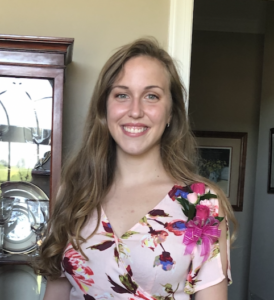
Anna Beeson earned her MS in Biology in Dr. John Meitzen’s lab at North Carolina State University (NCSU) investigating the dynamics of medium spiny neuron dendritic spines across the rat estrous cycle. She previously completed her BS in Animal Science and BA in Art Studies: Music at NCSU during which time she studied the role of ovarian structures in successful beef cattle reproduction. When she is not in the lab Anna enjoys spending time with her family, running, and painting. Publications
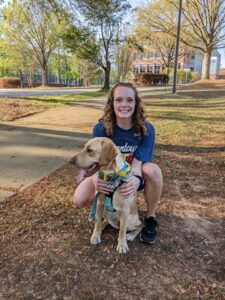
Sammy Rueckeis graduated with a B.S. in Biochemistry from NC State University in 2022. During her undergraduate career, Sammy conducted research in a plant biochemistry lab studying the mechanisms underlying the transcriptional regulation of the plant circadian rhythm and how this is altered under stress. Sammy joined the Caron lab in the spring of 2023 and is interrogating the RAMP-GPCR interactome. When not in the lab, Sammy enjoys running, hiking, and adventuring with her dog, Kirby.
